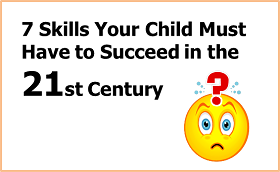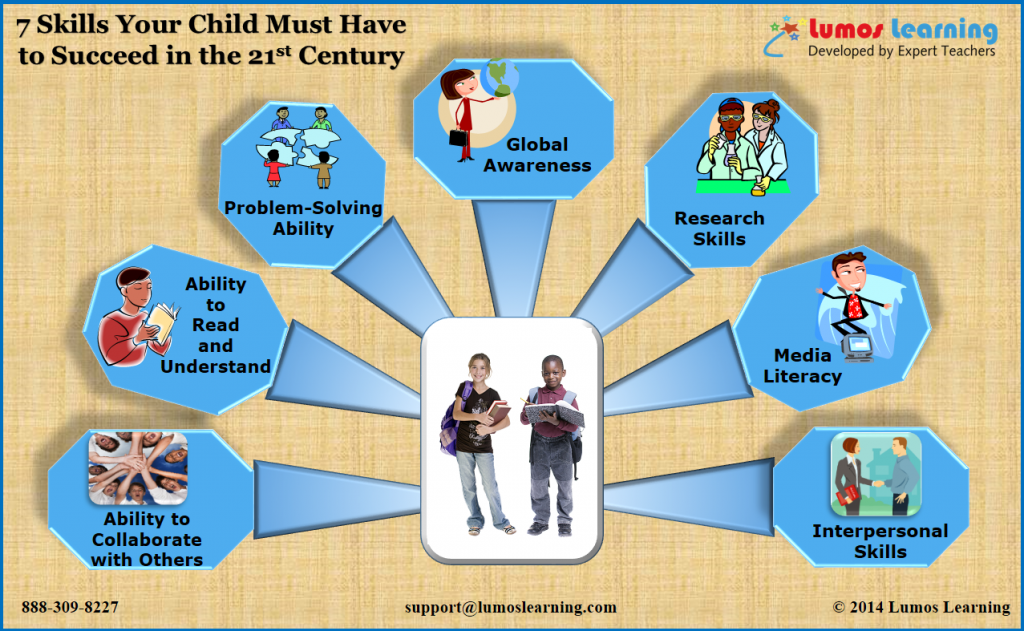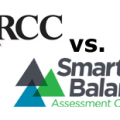
From educational leaders to policy makers, much has been said about “21st century skills” that students need to have to succeed in school and beyond. However, what are these skills? Though organizations and websites abound (all touting their own versions of critical 21st century skills), several commonalities emerge. The terminology may differ, but the following seven skills encompass many of the themes from these various sources:

1.Awareness of global issues. The world is at our fingertips like never before, and with our ability to communicate and gather knowledge in mere seconds, it is imperative for our children to think “bigger” than their immediate surroundings. With geography no longer a barrier, individuals can run a company with employees all over the world – and though this is nothing new, it’s the speed at which we can Skype, call, email or text that takes the ability to function with those far away to an entirely new level. Those who are sensitive to and aware of issues on a global scale can think with a “big picture” mentality that allows them to leverage a tremendous amount of power in terms of opportunity and options (for employment, business opportunities, living and travel, etc.).
2.Interpersonal Skills. With the aforementioned ability to communicate so easily, it’s equally important for our children to be able to communicate effectively. This includes not only oral communication (face-to-face, over the phone, Skype, etc.) but also in written form: with texting, social media, blogs, emails, and more, written communication is a common way to interact with individuals and groups quickly and easily. And with the ability to communicate so easily comes responsibility. Think of all the celebrities who live to regret some of their pictures and comments posted on the news (or in social media). Being aware of the immediate and “uneditable” nature of our communication is imperative for tomorrow’s leaders to understand in order to foster healthy, positive relationships with others.
3.Creativity and Problem-Solving Ability. We have lived through economic crises, wars, and terrible global events, and those who make the world a better place view problems as opportunities. These change makers look for solutions in even the most dire situations. Being able to think creatively allows one to differentiate himself or herself from the pack and establish a leadership position. Although some may believe that these skills are innate gifts, the ability to think flexibly and solve problems are skills that can be taught – to everyone’s advantage.
4.The Ability to Read and Understand (with increasing complexity). The Common Core states that “students must be immersed in information about the world around them if they are to develop the strong general knowledge and vocabulary they need to become successful readers and be prepared for college, career, and life”, and this includes the aptitude to understand academic vocabulary, along with the ability to read increasingly complex texts – and make sense of them. To that end, students are now being asked to support their ideas with text-based evidence (as opposed to an overreliance on personal experience and anecdotes) and develop deep, lasting understanding of each subject. (from http://www.corestandards.org/other-resources/key-shifts-in-english-language-arts/)
5.Technological and Media literacy. From Moore’s Law (which established that the processing speeds of computers were expected to double every two years) to Kurzweil’s “Law of Accelerating Returns” (which posits that “technology and evolutionary processes progress in an exponential fashion”), it is clear that technology continues to advance at a mind-boggling rate. When you think about the technologies that have recently become part of our everyday lives (like iPads, Facebook, etc.) along with the related new “vocabulary” (think “tweet”, “app”, and “text”), it has become commonly accepted to expect that others understand the jargon and the devices. This means that those who don’t have at least some working knowledge of technology find themselves at a disadvantage. Many jobs in today’s world involve some sort of involvement with a basic understanding of technology, and for those who possess high levels of technological acumen, entire industries welcome those skills so that innovation will continue to expand in this area.
(from www.mooreslaw.org and longnow.org/seminars/02005/sep/23/kurzweils-law/)
6.Research Skills. With technology advancing so rapidly, human knowledge is evolving more quickly than ever before. And though it may not be possible to know “everything” or be an expert who knows “all there is to know” in a given field, it will be necessary to have the skills to obtain that knowledge when it is needed. This means that the process skills of knowing how to find the answers and where to go to find credible information are crucial for young learners.
7.Character Traits and Habits of Mind. The ability to collaborate with others, remain flexible (both in behavior and thinking), and persevere are imperative skills that lead to success. Gone are the days of getting a job and staying with a company for twenty years: embracing change rather than resenting it, and being able to weather the storms of life are what differentiate those who are beaten down by life’s challenges and those who rise above them.
Certainly, today’s students are faced with high expectations as they move through each year of school. However, those who develop these “21st century skills” will find themselves in an enviable position: they will be prepared to contribute positively to society, individually and collectively, in our ever-changing world.






Pingback: The 7 Skills Your Child Must Have to Succeed in the 21st Century | Think Educative